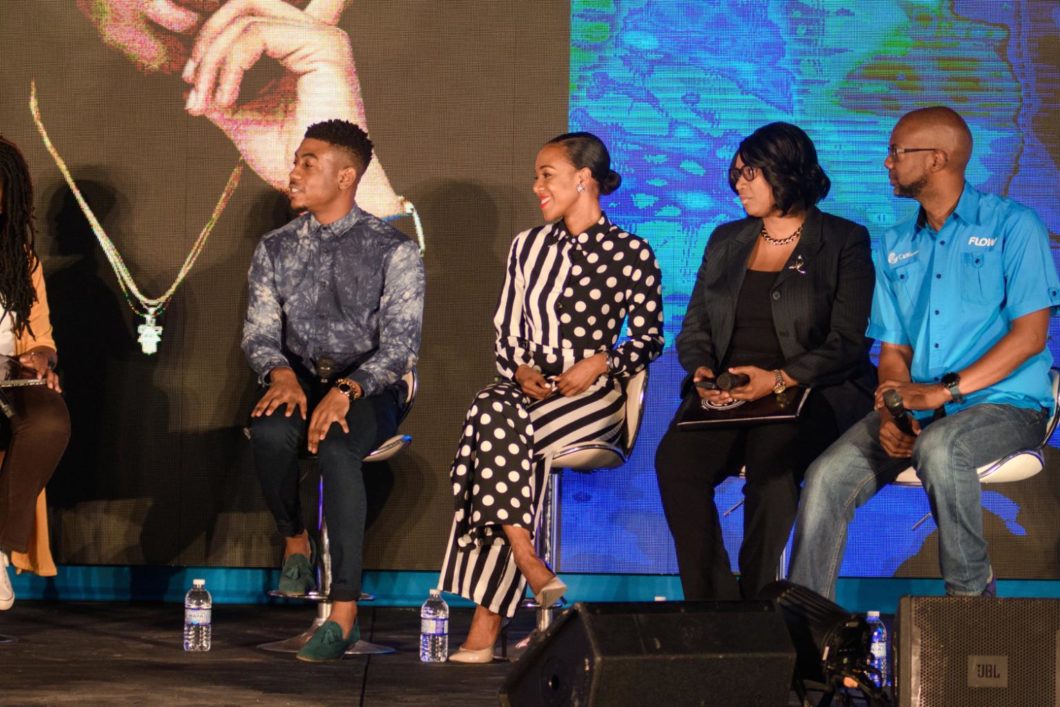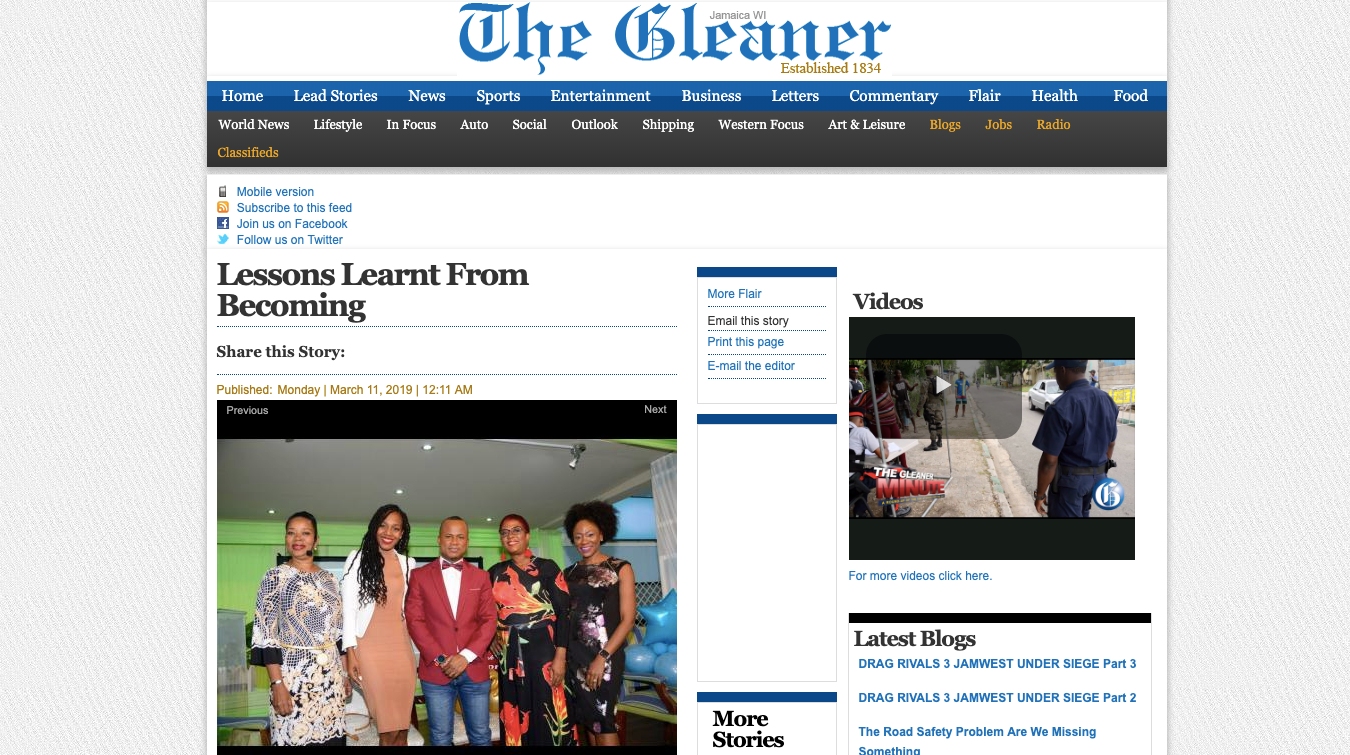February 11 is recognized as Safer Internet Day around the world. Each year, FLOW Jamaica – one of Jamaica’s primary telecom giants – visits various schools to do their part in educating our youth about the pitfalls of the Internet and how to use it safely.
This year, I was invited to be a part of a panel discussion sharing safer Internet practices with over 500 high schoolers gathered at Merl Grove High School.
Social Media isn’t bad, it’s the users
I’ve heard it said that the Internet is broken, that social media has become a negative space, and while I definitely believe that there are some negative aspects of the virtual world, it’s certainly not all bad.
In fact, so many of us, myself included, use the Internet for powerful good. Safer Internet Day allows us to educate young people about the benefits of creating and cultivating communities around our interests, motivate and support others in their respective journeys, connect and collaborate with others to build our careers and find our dream jobs, and so much more. Many even put themselves through school by using social media to build businesses and find educational opportunities!
But it’s hard to deny how detrimental the misuse of the Internet can be. Cyberbullying can have significant, lasting impact on the development of our children. Increasingly, we have lost youth to human trafficking and molestation or they have lost scholarships, sponsorships, internships or job prospects due to the misuse of the internet.
In order for us to benefit from the Internet, we must understand and prepare ourselves for the dangers, and ensure that we are not ourselves contributing to the negativity that affects others online. So it was a important opportunity for me to join this panel to share my experiences and recommendations for how teens can keep themselves safe online. However, I believe the matters we discussed should be heard far beyond that room, so with that in mind, I’m sharing a few highlights from the conversation.
Safer Internet Day means Protecting Yourself from Predators
It’s very easy to get complacent online and share details of your life with friends and acquaintances, however you must always be mindful that much of what you post online is visible to anyone who wants to see it, and some of these people may not have your best interests at heart.
With this in mind, no one should reveal private information like residences, schools, etc. in public forums. You should also take extreme care in sharing your current location or where you plan to be. Refrain from sharing details of your personal life that could help others to decipher passwords and security questions, like your mother’s maiden name, your birth date, and the street you grew up on.
Safer Internet Day is about avoiding Posting Negative/Libelous Content
I always encourage people to be authentic and share their true selves online, but even when doing so, you must be mindful of what you post because it could lead to some very negative consequences.
Collecting or disseminating material that is malicious or libelous could have legal ramifications. Additionally, sharing lewd or defamatory content and photographs of yourself or others can have devastating effects on reputation, self-esteem, mental health or future career prospects.
If you happen to post something negative and you are receiving any backlash for doing so, it’s not the end of the world. However, the steps you take to rectify the situation matters. This clip below, shared by Flow Jamaica on Instagram, shares what I recommend in this scenario.
Receiving Unwanted/Unsolicited Content
One of the questions asked at the forum was how we, as avid social media users and influencers, deal with getting material we do not want to see, such as inappropriate photos or pornographic material.
My answer is simple. You have the power and the ability to say no. You have the choice to curate an online space for yourself that aligns with your values and if someone violates that, then you have the option to tell them to refrain from doing so. If the problem persists, that’s when you Report, Block, Delete. That’s what those buttons are there for, and if the need arises, don’t be afraid to use them!
Handling Trolls & Negative Influences
Trolls and attention seekers can be a nightmare to deal with on social media. They deliberately prey on people’s insecurities and force negativity into your space. Fortunately, the best way to deal with trolls is to ignore them entirely. Trolls need to be fed, and if no one is buying into the garbage they spew, they simply stop and move on.
I don’t get trolled online. I have cultivated a space of positivity and upliftment that leaves no space or vacancy for negativity. And on the rare occasion that someone comes on my page with such negativity, the community helps to flush them out way before I even get the chance to see it. Who you network with, who you communicate with has a significant impact on what you attract.
Offline Effects of Cyberbullying
Cyberbullying is one of the biggest problems among children online. The ability to extend bullying from the grounds of a school compound to the Internet, which can be accessed by a much wider audience 24 hours a day, means that children are dealing with this every waking minute of their lives.
There’s a myth that when you’re suffering from cyberbullying it’s restricted to online, but it has a much greater effect in the physical world. Kids who experience cyberbullying often end up not wanting to go to go to school or socialize with their peers, which leads to poor academic performance and poor social skills that can impact their entire lives.
Try to monitor kids activities online to ensure that they are not experiencing or exhibiting such behaviour, and if they are, be sure to communicate openly with them and remove them from these platforms, if necessary, to prevent future harm.
The Internet isn’t simply “the online world” anymore. It is deeply integrated into our daily lives and can have lasting impact on our personal and professional status – some effects are more immediate than others. Just like in “the real world”, there are lots of ways to explore and grow positively, but the dangers still exist, so we must protect ourselves, and refrain from contributing to the negativity ourselves, so that we can create a safer Internet for everyone.











